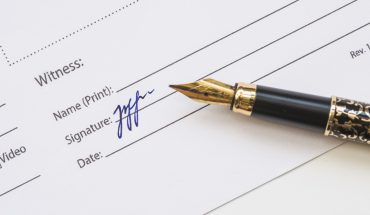Top 6 Power of Attorney Questions
- 30 Jul 2020
- Download PDF
A Power of Attorney is a legal document that gives a trusted person the legal authority to act for you, and to make legally binding decisions on your behalf. If you do not have a power of attorney then you should contact us and find out more.
There are two broad categories of Power of Attorney, Financial and Medical.
Below are 6 top questions dealing with Powers of Attorney:
Circumstances when a Power of Attorney is particularly useful:
- to relieve yourself of the day to day demands of financial paperwork and record keeping;
- as a safety net when travelling or to allow someone to handle your affairs in your absence;
- to avoid burdening family or friends with the responsibility of looking after your affairs; or
- if you are unable to manage your prosperity or financial affairs. Who should I appoint? You can appoint anyone, although the choice of who you want to appoint should be made with careful thought as you are providing them with considerable power. An ideal attorney should:
- have your best interests at heart;
- have integrity;
- someone who is going to be a beneficiary in your Will – for example, may people appoint their partner, their eldest child, or their sibling.
- be willing to act in that capacity;
- have competence in areas of relevance;
- be able to act in a business-like manner;
- be able to spare the time necessary for the task;
- live in the locality in which they are to act;
- be agreeable to respecting the confidentiality of the donor’s affairs; and
- be impartial and have no known conflict of interest.
Are there different types of Powers of Attorney?
Yes, a General Power of Attorney which is:
- only valid while you have legal capacity;
- useful if you are going away for an extended period and you do not want the authority to continue should you lose legal capacity; and
- usually drawn up for a specific purpose with specific or general powers. A specific Power of Attorney which:
- would be designed to delegate limited and restrictive powers for a specific purpose, or specific tasks
- some examples of situations where this type of Power of Attorney would be helpful are: – for the purpose of signing documents to complete a specific transaction – providing a family member overseas the ability to give instructions to lawyers in order to manage a Court matter in another Country And an Enduring Power of Attorney (EPA) which:
- continues to be valid even if you lose legal capacity due to disability or illness;
- may empower your attorney to make financial, property, lifestyle and health decisions;
- may be activated when required or upon loss of legal capacity; and
- allows your attorney to commence or to continue to manage your affairs even though you have become unable to give lawful instructions.
Is it better to have more than one attorney?
Some thought could be given as to whether you wish to appoint more than one person with the Power of Attorney, as this may provide you with more flexibility. However, appointing more than one Attorney could be problematic if the two attorney’s you appoint do not get along well with each other, or if conflict is foreseeable. This may include siblings who do not see ‘eye-to-eye’. Some examples to illustrate why it is helpful include siblings who should act together, or you are unsure if one should act on their own, or to allow the power to continue if one attorney dies or cannot act. This also applies if you appoint a spouse and a child as an alternative in the event the spouse dies. You can also appoint attorneys to act “jointly” or “severally”. When you appoint two attorney’s ‘jointly’, they must both agree before any decision can be made.
However, if you appoint your attorney’s ‘severally’ this provides them with the ability to make decisions individually and without having to come to agreement with each other. This means that either one of your attorney’s can then make these decisions for you if they cannot agree.
Should I pay my attorney?
This is not necessary to give legal affect to the power, and for a financial power would normally only be considered if the attorney(s) is a professional.
How do I know if the person has sufficient mental capacity to make a power of attorney?
There is no simple formula, but in general terms they must be able to:
- understand the major consequences of a decision;
- take responsibility for making that choice; and
- make a choice based on the risks and benefits that are important to them.
If there is any doubt about capacity, it’s best to get in touch with a doctor and ask for a written opinion. Remember, different powers require different levels of understanding. If this is done it is wise to have the Power of Attorney signed on the same day as you get the medical report so there can be no subsequent claim that the appointment was invalid.
In our view many clients do not recognise the possible benefits (and pitfalls) of Powers Of Attorney.
The need for a Power of Attorney can be numerous. In case of accident, sudden illness, planned or unexpected absence, or when you just can’t cope, you may need someone to manage your financial affairs. So it doesn’t matter if you are old or young, in business or not, if you do a lot of travelling or not, there are great benefits in having a power of attorney.
To find out more about Powers of Attorney and their benefits call us on 03 9387 2424 or email info@rrrlawyers.com.au today and see how we can help
Posted in: Conveyancing and Property Law,
Following the breakdown of a marriage or de facto relationship, i...
This might seem a basic question but so many people simply do not...
Unfair dismissal matters can be complex and frustrating for both ...
The purchase of a home is arguably one of the most important purc...
There have been updates in the law regarding disclosure requireme...
When renting business related property it is important for both L...
Maintaining cash flow is essential to any business. Writing off d...
We often receive instructions after family court orders have been...
In this issue, we wish to introduce and outline an area of law of...
Do you have a friend or relative who has just separated? ...
How to get legal help for a victim of family violence? ...
Most people think that if a person is charged by the Police or Au...
A Power of Attorney is a legal document that gives a trusted pers...
It is often stated that the purchase of a house is the largest in...
The Fair Work Commission has powers to make anti-bullying orders ...
Introduction Mr. Prakash Raniga and his team have acted...
Buying a franchise is a good way to share in the success of a wel...
There has been an upswing in media reportage of domestic violence...
The team at RRR Lawyers specialise in assisting those who are pur...
You are required to enter into a major domestic building contract...
Things you need to know BEFORE the auction day Buying a...
Relationship difficulties and breakdowns are a sad reality of mod...
While many people are unlikely to nominate estate planning aka �...
Australia is a multi-cultural society, one of the most ethnically...
Body art such as tattooing and piercing has enjoyed popularity ov...
If you are a grandparent and face the sad circumstance of a break...
When starting a legal case, you must ‘serve’ the party agains...
Due to reforms introduced by the Building Legislation Amendment (...
The 2017/2018 Victorian Budget has made substantial changes to la...
The Building Legislation Amendment (Consumer Protection) Act 2016...
It is well known that a Will is a legal document which sets out h...
Social media – Facebook, Instagram, Twitter, Snapchat and the l...
Claims can be made for further provision from a deceased estate i...
Unlike married couples, de facto partners cannot apply for a divo...
GST and Residential Property Transactions The...
It is important for everyone over 18 to have a will to make sure ...
The new Powers of Attorney Act 2014 (Vic) commenced on 1 Septembe...
In one famous case, marriage is described as “the union of a ma...
Many migrants do not have relatives in this country beyond their ...










































